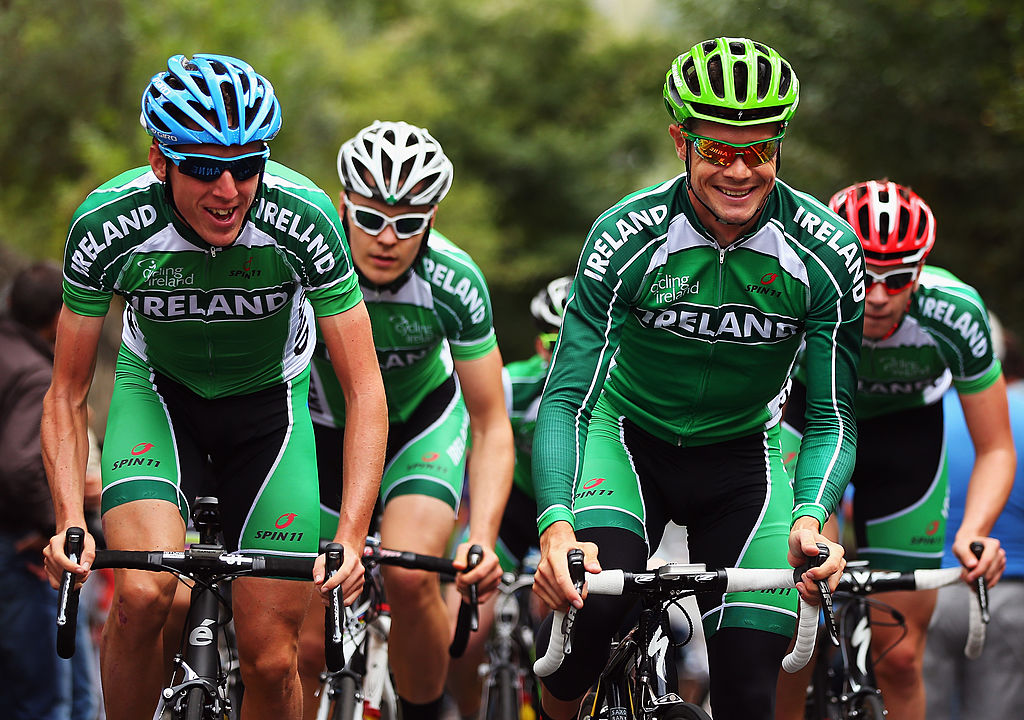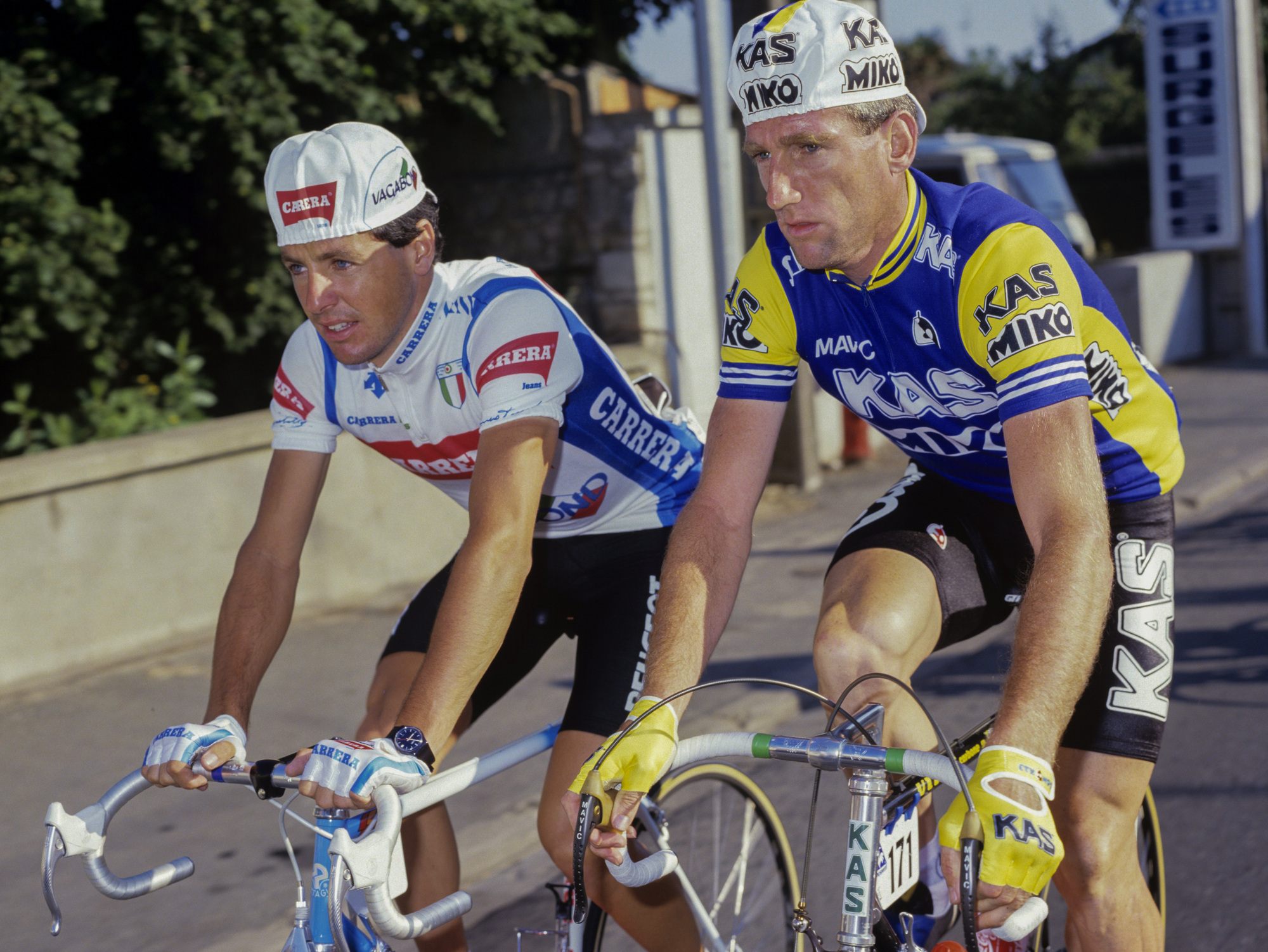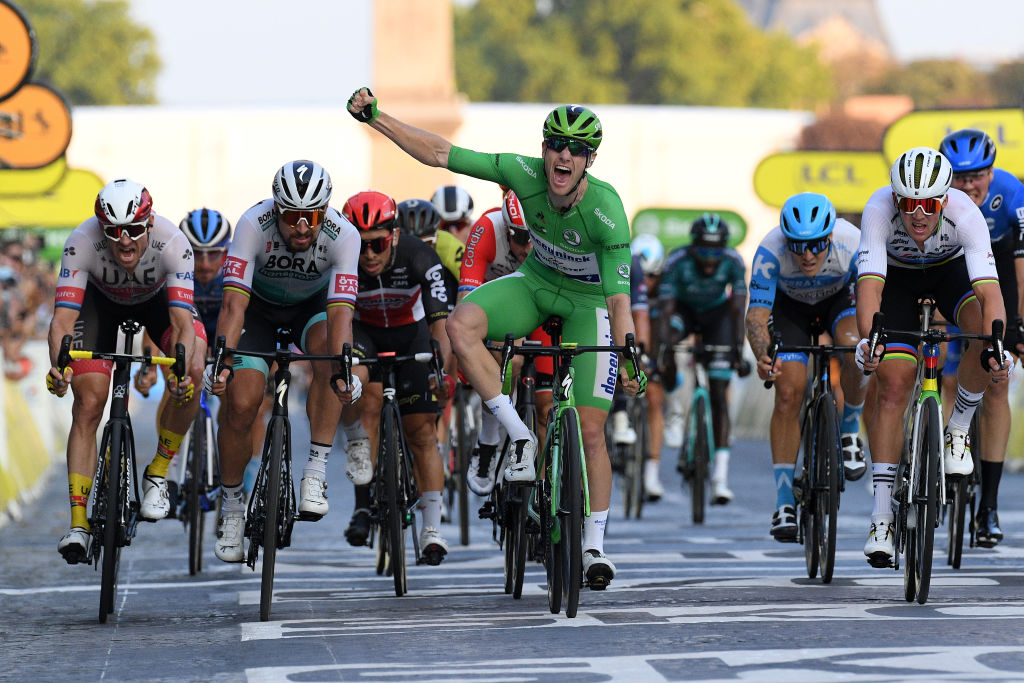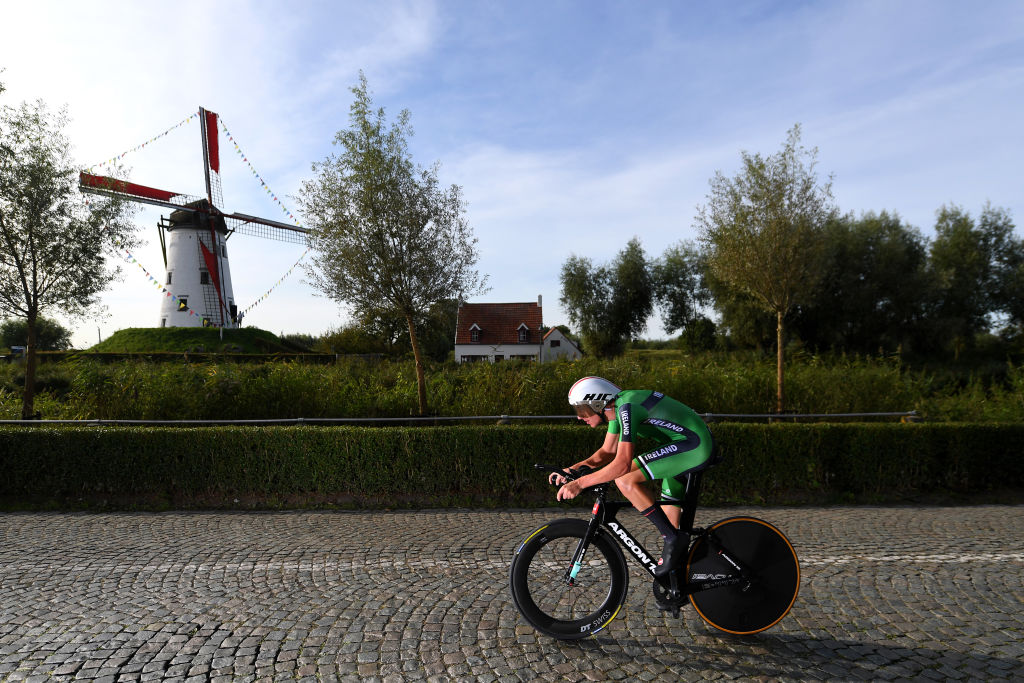As an era ends, what now for Irish cycling?
Dan Martin and Nicolas Roche have ended their careers but that doesn't mean Irish cycling must head into the wilderness again

It’s the end of an era in Irish cycling. On October 3rd Nicolas Roche (Team DSM) put in a big bid to win the Irish road race championships for the third time in his career, attacking early on with Eddie Dunbar, being left stranded alone out front when Dunbar crashed on a wet corner, and ultimately finishing sixth.
Many within Irish cycling didn’t know it at the time, but that was his final-ever race as a pro.
Six days later his cousin Dan Martin (Israel Start-Up Nation) rode Il Lombardia. He had won the Classic back in 2014 and chose the event as his own final showing. A repeat victory would have been the dream scenario but he ultimately didn’t figure in the final battle. Drained by the race but celebrating his newfound freedom, he suggested afterwards that his energy banks were completely depleted after 14 years in the pro peloton.
“It was so brutal out there, so when I was nearing the finish, I felt so complete with my decision,” Martin said. “I really have nothing more to give.”
And that was that. In the space of less than a week, the two most consistently successful Irish riders of the current era had hung up their racing wheels.
Even if they didn’t each scoop a final win, even if things didn’t end with a Hollywoodesque blaze of glory, both had big careers and will leave a void. So what does that mean for Irish cycling?
To weigh this up, we must evaluate what they achieved. Sean Kelly is the most successful Irish rider of all time, and is regarded as one of cycling’s greatest competitors in the post-war era. He is also highly respected as a cycling analyst, and has a keen understanding of the sport.
Get The Leadout Newsletter
The latest race content, interviews, features, reviews and expert buying guides, direct to your inbox!
He is clear about the value of both rider’s careers.
“Dan was really successful, when you see the style of rider he was,” Kelly told Cyclingnews this week. “It was a big achievement to win a Liège and a Lombardia. Of course there are his other results as well, stages in the Giro and the Vuelta and the Tour, and that. I think he had a really good career. He made a name for himself and made some good money, which is important.
“For Nicolas, it was of course always going to be difficult one after the father [Stephen Roche]. He was always going to be compared to him. But he carved up a great career for himself and did well. I think he got the best out of himself.”
As Kelly mentioned, any assessment of Martin’s career must focus on his Liège-Bastogne-Liège success in 2013 and his Il Lombardia triumph one year later. The first drew on his strengths as a climber, the second on his skills as a racing tactician. He also collected two stage wins in the Tour de France, two in the Vuelta a España, and completed the set earlier this year when he soloed to a brilliant victory on stage 17 of the Giro d’Italia.
His achievements also include overall victory in the Volta a Catalunya and Tour de Pologne, placings of sixth, eighth and ninth in the Tour de France, as well as fourth and seventh overall in the Vuelta plus tenth overall in this year’s Giro.
As for Roche, he wasn’t quite as successful but impressed nonetheless. His haul includes two stage wins in the Vuelta, two separate stints in the leader’s jersey, plus overall finishes of fifth and sixth. Scratch below the surface and you see an incredible consistency too: he clocked up 43 top ten stage finishes at the Vuelta, and 65 top ten Grand Tour stage finishes in all.
Between them, they enlivened the sport for almost two decades, giving Irish fans much to cheer about.
But, as Kelly notes, it wasn’t easy for them at all.
A weight of expectation

Heading into the mid 90s, things were suddenly very sparse for Irish cycling. All had been rosy up until then: Kelly and Roche had been two of the biggest names in the sport and, between them, had won pretty much everything worth winning. The former had taken Classics, multiple stage races, a then-record four green jerseys in the Tour de France plus overall success in the Vuelta a España.
Roche’s star didn’t burn quite as long, but dazzled in 1987 when he won the Giro d’Italia, the Tour de France and the world championships.
Despite Ireland being a small country, the duo were first and second overall in the world rankings for a period of time. This success created a huge cycling boom back home.
On the surface, that was a blessing. The grassroots thrived and many were motivated to follow their example. But there was a problem too. Despite an abundance of talented riders, people such as Anthony O’Gorman, Stephen Spratt, Robert Power, Conor Henry, Julian Dalby and others, nobody made the step up. Morgan Fox, Ciarán Power and 1998 world junior champion Mark Scanlon would later join the paid ranks, but never reached the same level of success as the top two had.
“I think we had really good pool of talent of riders over a good number of years,” Kelly said. “There were quite a few guys who were performing real well and looked like they were going to go on and reach the professional ranks, at least. From there they might be able to do some good things and win some good races.
“But I think things changed with the Eastern Bloc countries coming into the sport. That made it more difficult for the European countries because those guys were really hungry. They were riding for a fucking jersey and shorts and a bike…for nothing, in that time.
“There were so many of those Eastern Bloc riders, so many good riders available, and they were all really, really hungry to perform. It got so difficult to get into a team that it didn’t help the Irish riders at all.”
There was perhaps another factor. Watching Kelly and Roche on TV, seeing the successes and the smiles, the congratulations and the champagne, gave the impression that the sport was a glamorous one. But, as Paul Kimmage’s Rough Ride book showed, this was not the case. Things were a lot grittier than they appeared. The contrast between perception and reality may also have derailed the Irish riders.
Pressure was a huge obstacle too.
“I suppose the Irish people got a bit destroyed [spoilt] with Roche winning a Giro and Worlds and Tour and I winning all those Classics and Paris-Nice as well,” Kelly reflects. “It was always going to be difficult, as it is in other cycling countries. Take Belgium: they have a champion coming now and they always start comparing them to Merckx. I feel that is unfair, but that is the way it is and that’s the way it’s going to be.”
Pressure from the home country aside, there was also a huge weight of expectation from amateur clubs and professional teams. Kelly and Roche were stars, and there was a presumption that others from Ireland could be the same.
And then there was another sort of pressure. The sport went through a particularly dark time during the advent of EPO and any riders trying to race clean had an uphill battle to perform.
Over time, things would improve thanks to police raids, better anti-doping measures and the introduction of the biological passport. But even if Irish riders such as Roche and Martin would go on to reach the top ProTour/WorldTour level and win big races, comparisons with the past were a big impediment.
“For Irish people who were following the sport, those people who were keen into cycling, they would know the value of what Nicolas and Dan achieved,” Kelly said. “But there is an awful lot of other people who would always be talking about what Stephen did and I did during my career.
“They’d be matching that against the others [Martin and Roche], saying ‘you know, they didn’t win anything like Roche and Kelly before them.’ Maybe they didn’t get the exposure or the recognition because of what we did. They were always in a bit of…I don’t know if you’d call it a shadow, but they were always being compared in that way. That’s unfair, really, because generations are totally different. Things had become much more difficult since we were racing.
“I think the races have got much more competitive now, making it more difficult to win. We were the leaders of our teams and the team was working for us, whereas now in a team you have maybe half a dozen guys, or even ten guys, who can win races. So it’s a bit more difficult.”
Four WorldTour riders for 2022

Those who look for parallels in history may have been a little panicked when Roche and Martin retired. They have been there so long, and clocked up such good results, that the departure of two of them in less than a week seems a big setback. This is compounded by memories of the long drought after Kelly and Roche retired.
Things are however different from the 1990s. Ireland lost two riders from the 2021 list of WorldTour teams, yet three remain. Sam Bennett has clocked up strong successes, including two stages plus the green jersey in the 2020 Tour de France. And while he has had a difficult season due to a knee injury, he has returned to racing and is fired up for next year, when he will be shifting from Deceuninck-QuickStep to Bora-Hansgrohe.
Ryan Mullen has changed coaches, returning to work with Sebastian Weber of INSYD, and has seen a return to form. He won both the national road race and time trial championships, clocking his best numbers in three years in taking the latter, and said he is fired up to lead out Bennett next year – who he will be joining at Bora-Hansgrohe – while wearing the Irish champion’s jersey.
Eddie Dunbar (Ineos Grenadiers), too, is WorldTour level and while he had bad luck this season with crashes and COVID-19, the Corkman has the ability to fill the slot left by Martin. Greatness beckons if he can deliver on his potential.
Then there’s Ben Healy. Still just 21 years of age, he is the youngest-ever winner of a stage of the Tour de l’Avenir and took a stage win in this year’s Baby Giro. He’s just been confirmed as joining EF Education-Nippo on a two year deal, ensuring that Ireland has four WorldTour riders in 2022.
That’s a whole lot different to the situation after Kelly and Roche retired. Still, while Kelly is encouraged by that, he admits that he is surprised Ireland doesn’t have more riders at this level.
“It’s great that we have the riders we have. But when you look at some of the nations who have riders in the WorldTour, you would be expecting to have more. For example, look at the amount of Australians that are in there.
“If you went back ten years and asked me the question then how many WorldTour riders we would have, I would have said that we would probably have eight or ten. But it is still proving difficult to make it to that level. I don’t know what the answer to that is.”
'I think he will be hungry'
The 2022 season will tell us a lot about where Irish cycling is heading. Bennett is now 30 years of age and is keen to regain his momentum after a difficult few months. Speaking at the national road race championships, he told Cyclingnews that he felt he had missed out on what could have been one of the best years of his career. On the flip-side, he said that he hoped the enforced break from racing could extend his time in the peloton.
He's a rider who draws inspiration from proving people wrong. Whether it was in persisting until he got a pro contract, or in showing last year that he did deserve sprint leadership in a team, he rises to a challenge and takes motivation from pressure.
“I think he will be hungry, because he will really be up to prove a point in going to a new team,” said Kelly. “And I think the situation with QuickStep and Lefevere and all that will make him want to show that he can still win.
“You never quite know how a rider will be after a time out; sometimes you come back and you have been refreshed, other times when you are out of that top level for a while it can be difficult to get back. But I think he will be back at that high level again.”
He's taking a wait and see approach for now with Healy. Given he is just 21 years of age and is yet to have a prolonged period of time racing at a high level, he believes it is too soon to predict how is career will turn out. He points out that many riders have won stages in the Tour de l’Avenir but haven’t gone on to big things as pro riders. It will, he states, take one or two seasons to get a better feel for just how good Healy will ultimately be.
As for Dunbar, Kelly is clear on his talent but argues that he would have been further ahead in his career had he made a different decision early on. Dunbar rode for two years with the Hagens Berman Axeon team, a well-known development squad. That seems to have gone well, considering he eventually secured a WorldTour contract with Team Sky/Ineos Grenadiers, but Kelly believes things aren’t so simple.
“I remember when he went to [Axel] Merckx’s team. We had been trying to get him into the An Post team. We were chasing him and talking with him. I haven’t really said this in public before, but I think he made the wrong decision there. He was promised races in Europe and he never really raced in Europe. He was only doing American races.
“I think he lost a bit of time there. We were prepared to try to put different riders on the team that could look after him, because his bike handling is…not great. We can see the way he is crashing. He crashes a lot. What we wanted to do with Bogaerts [Kurt Bogaerts, the general manager] was to give Eddie two riders on the team to take him around, to teach him how to ride in the peloton. That was the time to do it, considering the age he was at. For me, he lost two years there.”
Kelly sees further missed opportunities in this season. Dunbar helped Richard Carapaz win the Tour de Suisse, finishing 12th overall himself and winning the best young rider award. And while he wasn’t due to ride the Tour de France, he was set to ride the Vuelta a España until he caught COVID-19.
“There was going to be an opportunity there to prove again what he was able to do in the Tour of Switzerland. With Ineos in this Vuelta, there was a lot of opportunities to get the breakaways and ride your own race, as such. He missed that boat, and that was a big disappointment for him.
“But going forward, he is still young. There are still a lot of years left for him. It is important next year that he starts putting up performances for himself. It is okay riding like he did in the Tour of Switzerland for Carapaz, he was excellent there, but you have to start chalking up those results for yourself and looking like a potential winner of those races.”
A foreign country but not a foreign experience

Longer term, riders like Darren Rafferty give hope that there could be more professional riders on the way. The 18 year old finished fourth in the junior time trial at the European championships, missing out on a medal by just two seconds, and finished second last weekend in the junior Chrono des Nations time trial. Rafferty has secured a contract with Merckx’s Hagens Berman Axeon team and is hoping to do what Dunbar did before him and step up to the WorldTour in the coming seasons.
His praises are sung by Ireland’s national junior champion Martin O’Loughlin, who coached Sam Bennett as a young rider. O’Loughlin believes Rafferty has the potential to succeed in cycling, but also said there is another factor that should help Irish riders in the sport.
“I think we’re quite lucky in that we actually have some of the top agents in the world,” he told Cyclingnews. “And that actually does make a difference. You’ve got Gary and Andrew McQuaid, and you have Jamie Barlow. They are actively looking out for young talents.
“They come to Ireland, they are meeting up with all the Irish coaches at championships. They are going to Tour de l’Avenir and races like that. It makes a big difference that we have people out there watching, and ringing up people like myself to ask about riders. So that is a positive, in that we do have an opportunity in the shop window.”
O’Loughlin points out other benefits, including the running of strong youth races like Rás na nOg, the Junior Tour of Ireland and, for women, Rás na mBan. There’s a programme of international races too, something he sees as a shopfront for riders.
“I think we are in a good situation,” he said. “Back after Kelly and Roche, it was still a very, very tough thing to leave your home pre-internet, to just go off to a foreign country and try to establish yourself. Whereas now through the likes of talent teams, the junior programme, the under 23 programme, there have been so many opportunities for youngsters to actually race abroad and for them to feel that it isn’t a foreign experience. It is a foreign country but it is not a foreign experience.
“There are small things which help, like the fact that Lidl supermarkets are the same in every country. And that you can FaceTime people now. The loneliness that was there in the past isn’t there now. With RyanAir, you have now got links to other countries and to cheap flights.
“Considering all that, there is a lot going for Irish cyclists now.”